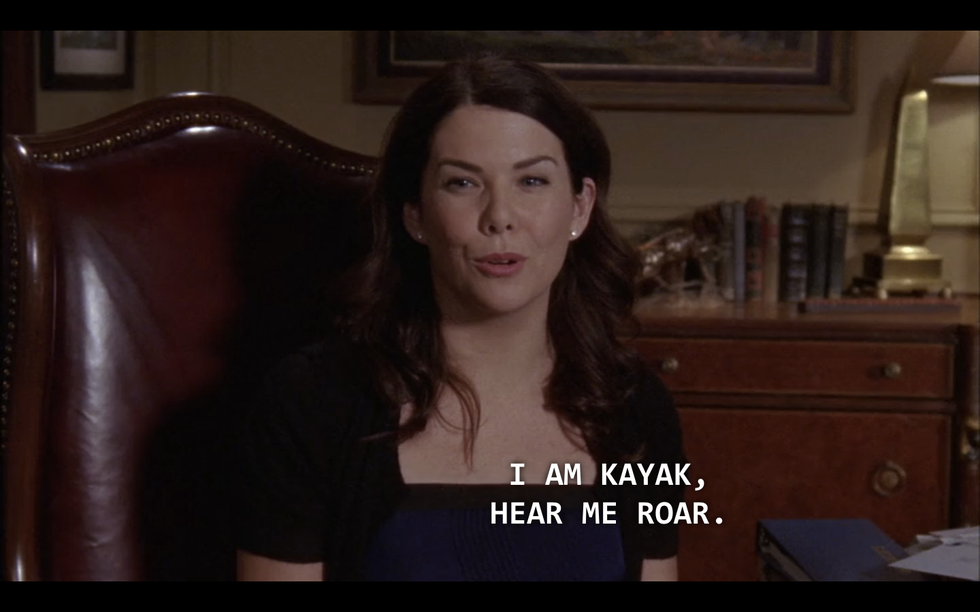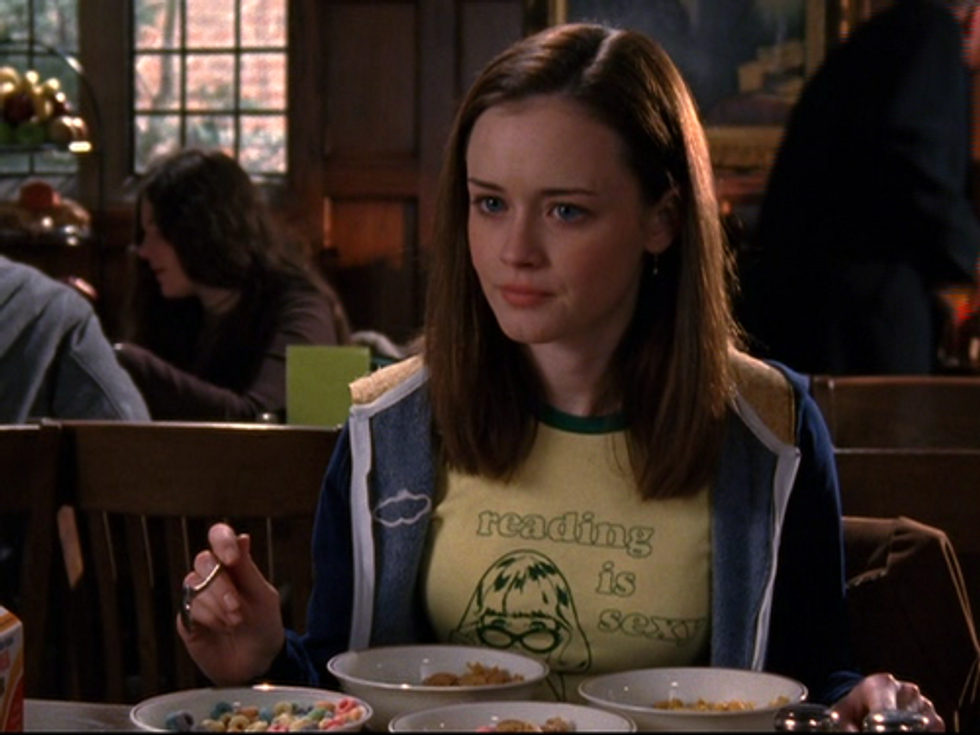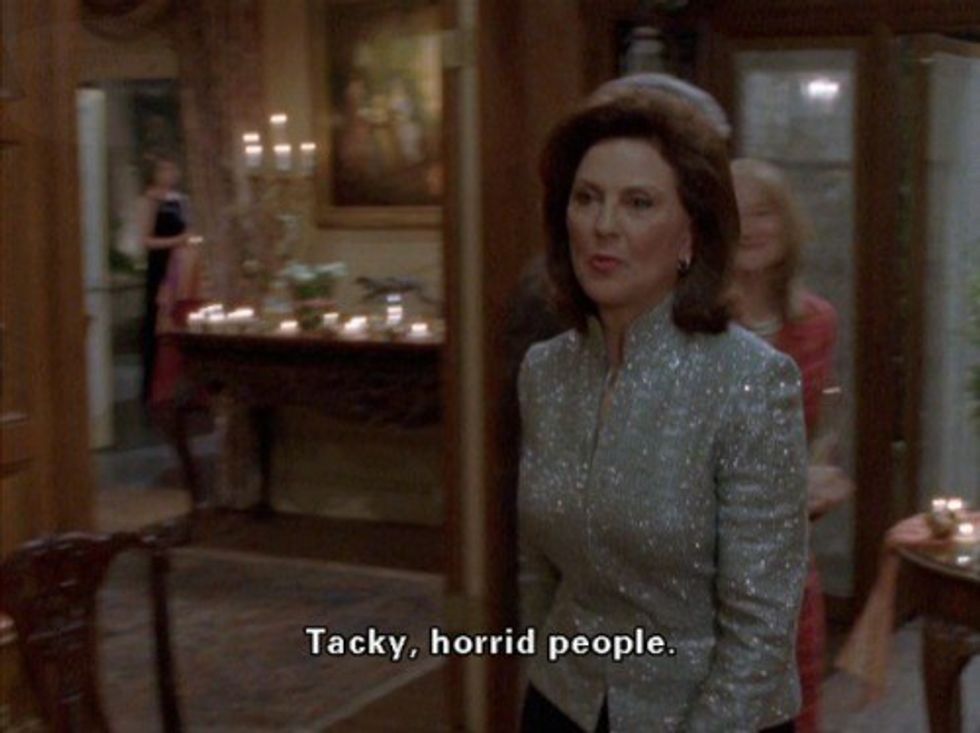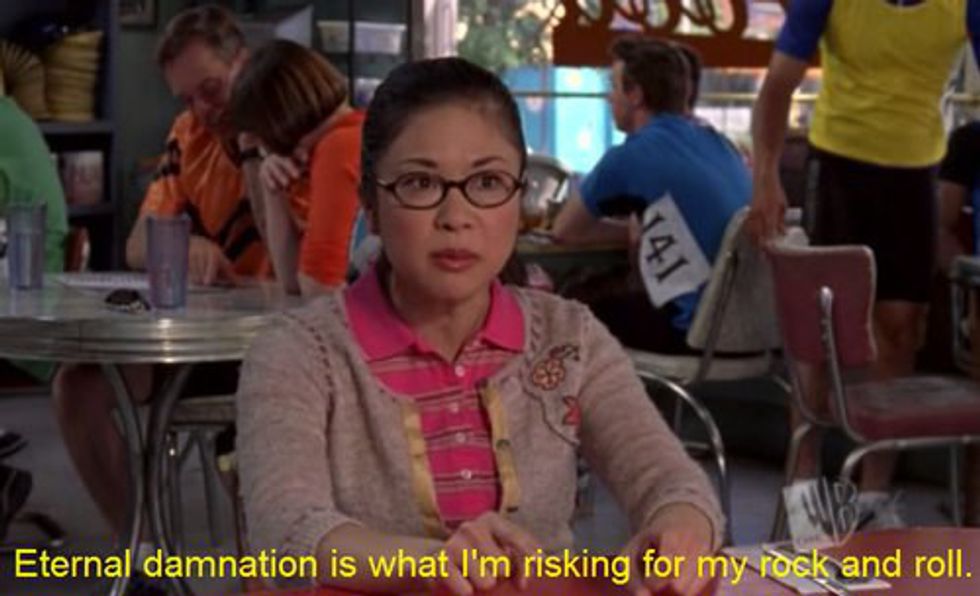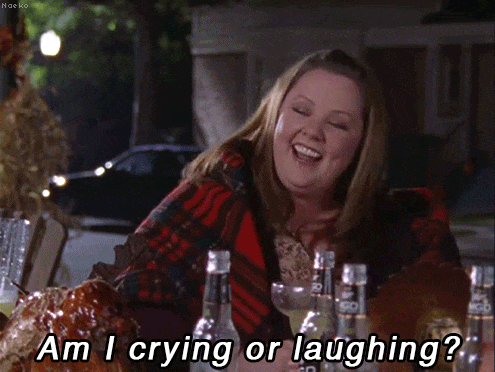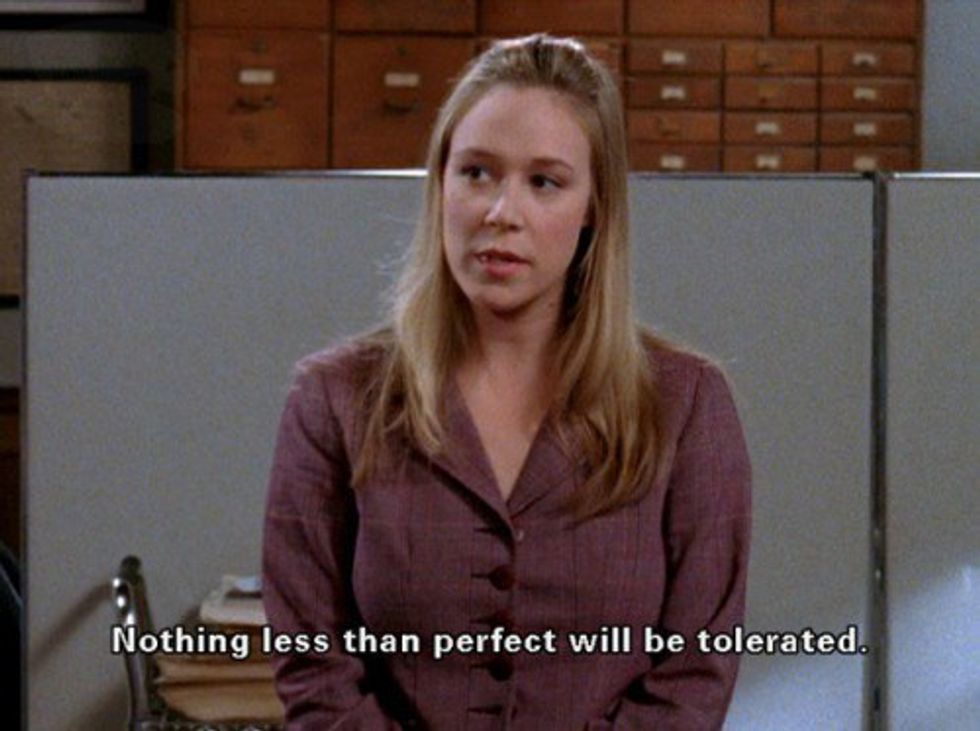As it was officially announced last week that a "Gilmore Girls" revival is really happening, I thought that I’d take this moment to remind everyone that this show was not only enjoyable, but also extremely important due to the fact that it is written and directed largely by a woman. "Gilmore Girls" was one of the only shows (back then and even now) to be wholly centered around the lives of women and to portray these women as multidimensional, realistic humans. The show does go into the love lives of Lorelai and Rory, the show’s two protagonists, but, at it’s core, "Gilmore Girls" is really about mother-daughter relationships. The men in the show play a peripheral role. "Gilmore Girls" is a step in the right direction because women and girls deserve more than stereotypes and degradation. We deserve more shows like "Gilmore Girls," where women have power and get to tell their own stories.
Here is why each "Gilmore Girls" woman was a great addition to television.
1. Lorelai Gilmore
Lorelai was a strong, independent woman who got pregnant in high school and who raised a child all by herself while simultaneously building a career. She started out with only a high school education as a maid at an inn and eventually worked her way to a management position before buying and running an inn of her own. If that doesn’t sound impressive, then I don’t know what does. Lorelai always made sure to put her needs and those of her daughter first and she had no trouble breaking things off with a man if he did not meet those needs, because Lorelai always knew that she could take care of herself and her daughter better than anyone else ever could. At her best, Lorelai reminds me of my own mother—silly and fun, but also wise. Lorelai is a friend to Rory first and a mother second. She always trusted Rory and let her make decisions for herself. It is refreshing to see a mother tell her daughter that it is okay to go to parties and date boys because it is just as important to be happy as it is to succeed.
The methodology that Lorelai used to raise Rory was probably the closest media equivalent to the way in which I was raised and it’s nice to see a parent who trusts her kid represented every once in a while, instead of the images of slut-shaming parents that the media constantly bombards us with. It is also nice to see that the world does not fall apart when a child is left to her own devices. The image above is from a scene where Lorelai’s mother, Emily, is saying how her marriage is like a canoe. That is, Emily relies on her husband completely just to get by and if her husband “drops his oar,” then she can no longer navigate life, but Lorelai, on the other hand, is in a kayak and doesn’t rely on anyone else for stability. Lorelai is refreshing as a female character because of her competence and the fact that her most important relationship is not with man, but with her daughter.
2. Rory Gilmore
Out of all of the Gilmore women, I personally identify the most with the academic-minded Rory. I loved how she was bookish, but never a stereotype. She was smart and hardworking, but not inhumanly so. For instance, in an early episode, Rory gets a D on a paper and sleeps through a test, but she studies hard and makes her way back up to the top. All of Rory’s motivation was internal. She genuinely loved reading, writing, and learning in general. She did her homework not because she viewed it as a necessary evil or for external approval, but because she actually found it fun and saw academic rigor as an exciting challenge. While Rory’s schoolwork was her main focus, she also took time for friends, parties, and boys. It seems that there is a strict dichotomy between the teenage girls who drink and party and the ones who don’t in the media and, in that narrative, only the girls who don’t party do well in school. As a result, young women are given the message that fun is correlated with failure. I remember feeling that any desires that I had to party or listen to music when I was in high school had to be kept a complete secret. If people found out about the desires, then they would relegate me to the stereotype of a party girl and they wouldn’t take me seriously as an intelligent, academic person. Rory, however, breaks these stereotypes and is much closer to a woman who one would encounter in real life. She drinks occasionally, but doesn’t let partying become her whole life and she probably enjoys music and television just as much as she enjoys books.
Another positive aspect of Rory is that she drew strength from her femininity. Rory carried many stereotypically feminine traits—conventional beauty, kindness, gentleness, and quietness—yet, Rory was also an impeccable leader, becoming student body vice president in high school and editor-in-chief of her college newspaper. Proving Machiavelli wrong, Rory managed to find solutions to her problems just by being her sweet, caring self. Rory was a nice change of pace from the cruel, headstrong male leaders that one is used to seeing and she makes a person believe that kindness is a strength—not a weakness. In real life, women make up a puny minority of world leaders and perhaps it is because women do not have many role models to show them what a business or a country looks like when a woman is in charge. On a small scale, Rory Gilmore makes a good role model in that respect and it would be wonderful if there could be more like her—both on television and in real life!
3. Emily Gilmore
Emily Gilmore, Lorelai’s mother and Rory’s grandmother, was a high-class housewife. When one thinks of a housewife, the adjectives that usually come to one's mind are "lazy," "frivolous," and "dumb, gold-digger." Emily, however, was none of the above. Emily was the social organizer of the Gilmore household and an active member of the Daughters of the American Revolution. What the typical narrative of housewives misses is the fact that fancy parties can actually be very difficult to plan. One must arrange for food, decorations, themes, advertisements, and seating charts that will satisfy everyone. A viewer of "Gilmore Girls" learns that these sorts of parties are very important to Emily because they are where important connections are made and planning them is the closest thing that Emily has a job. The viewer learns that these parties are not frivolous because they are meaningful to Emily. Other than planning parties, another significant role that Emily plays is Lorelai’s mother.
While Lorelai and Rory are a “freakishly linked” mother-daughter pair, Lorelai and Emily’s relationship is far more fraught. In the first few episodes, it seems like Emily is the most horrible mother ever. She is cold, manipulative, and passive-aggressive, but, later in the series, we see that Emily’s behavior stems from the hurt that she felt when her daughter got pregnant, moved away from home, and almost entirely cut Emily out of her life. Emily worries that if she left Lorelai alone, then Lorelai would never see her parents again, so Emily feels as if she has to force Lorelai to love her. In many television shows and movies, when a woman is portrayed as an unlikeable character, then her unlikeability is the be-all-and-end-all of her personality. With Emily, however, her meanness is given the justification it deserves. In the real world, when women act like anything less than perfect little angels it is not because they are just naturally irrational and terrible people, as most television would lead a person to believe.
4. Lane Kim
I didn’t appreciate many of Lane's plot lines towards the end of the series, but, overall, she also exemplified a strong female character. Lane Kim was Rory’s best friend and, like Rory, Lane was intelligent and loved music. For Lane, music was not just a gateway to slackerdom, but almost an academic subject like English or math. She would put labor into her passion, spending hours listening to Nico or reading about Sonic Youth. Unlike Rory, however, Lane enjoyed playing music as much as listening to it. Eventually, Lane became a drummer in a rock band. As it currently stands, rock music (and really every style of music) is heavily dominated by men, which makes it difficult for women to break into the industry.
While fictional, Lane is nevertheless a good role model for girls with similar musical aspirations. Another reason that it was positive to see Lane on television is because she is Asian. The vast majority of television characters are white, so just having a little more diversity is refreshing. I am not Asian, so it’s not my place to conclusively say that she was a realistic portrayal of an Asian-American, but, in my opinion, she seems to be a step up from many other Asian characters in the media who are typically portrayed as exemplary, but also extremely foreign and exotic. Throughout "Gilmore Girls," Lane always seemed just as American as Rory and no less relatable. I often wished that I could jump into the show and be friends with Lane because she seemed very cool and down-to-earth, which are not qualities that are often given to Asian-American characters in the media.
5. Sookie Saint-James
Sookie was the head chef at Lorelai’s inns and Lorelai’s best friend. Like all of the other women on this list, Sookie’s livelihood was her job and her love life was practically an afterthought, but she does also date and marry a man during the show. Sookie and Lorelai both valued their friendship immensely and they never competed over a man or got into a petty fight. One way that Sookie was special as a television character is that she was an overweight woman whose weight was not referenced once. Most television shows do not even have a woman with an above average weight, let alone one whose appearance is not discussed. If there is a “fat” woman, then the show is most likely a comedy because the idea that a “fat” woman is a normal person who could find love and happiness is just oh-so-funny, right?
In American society, there is this previously agreed upon notion that if a woman is “fat,” she is automatically ugly and no man will ever want her. “Fat” female characters generally have plots that revolve around their “fatness,” their jokes are only funny because they are “fat,” and other characters interact with them or don’t because of their “fatness.” This negative, one-dimensional portrayal of overweight women in the media only fuels the hatred that women have for their bodies. For those who fatshame because they are concerned about the health of overweight women, consider two things. First, making a woman hate her body will only make her more likely to be self-destructive, that is, less likely to eat healthily and exercise. Second, weight does not necessarily correlate to health—a heavier person could exercise regularly and eat healthily while an average weight person could have an unhealthy disease or an eating disorder that prevents them from gaining weight.
"Gilmore Girls" was different from the vast majority of television in that Sookie’s weight and appearance were never a topic of discussion. In fact, Sookie could have been played by a thin actress without any script changes! Sookie had as much self-esteem as any other character and the assumption was always that Sookie was not only capable of being loved and finding pleasure, but that she deserved to do so. In this way, Sookie was a realistic character because women of all shapes and sizes can be happy in real life—a fact that should be more often displayed in the media.
6. Paris Geller
Finally, we have Paris Geller.
How can I even begin to describe the fiery, crazy, passionate person that is Paris? She starts out as Rory’s archnemesis and I know that when I first encountered Paris, I sighed and thought that she was going to be another typical popular girl who is just cruel to the new girl for absolutely no apparent reason (other than the fact that the script writers of those shows just don’t know very many women). However, like Emily, Paris becomes a rational and even lovable character over time. Viewers soon learn that Paris is only mean to Rory at first because she is highly insecure. Paris may have top grades and an in with the popular girls, but she doesn’t have any friends who she really connects with, the guy who she has a crush on is a total jerk to her, and her parents are distant and neglectful.
The one good thing that Paris really has in her life is her academic success and when Rory, who is both highly intelligent and extremely kind, starts at Paris’s school, Paris feels threatened that her one good thing will be taken away. Eventually, however, Rory sees beyond Paris’s difficult exterior and Paris and Rory become friends and then roommates in college. Paris’s intensity never lessens and it's often channelled into being a good friend for Rory because Paris begins to want Rory to succeed almost as much as Paris wants to succeed in her own life. Paris is quirky woman, the likes of whom have never before been seen on television. She is one who is highly ambitious, but also hilarious and, on occasion, sweet. Even Paris finds love with a man who pretty much only exists in the show to be Paris’s man because, again, every woman is capable of being loved—even tightly wound, borderline sociopaths like Paris.
"Gilmore Girls" was an exemplary show because of the women described above and I could not be more excited to watch these same witty and unconventional television women come back to life in the revival!




